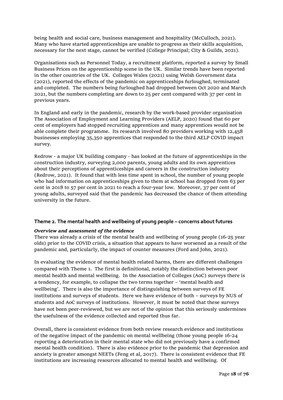
Page 18 of 76
being health and social care, business management and hospitality (McCulloch, 2021).
Many who have started apprenticeships are unable to progress as their skills acquisition,
necessary for the next stage, cannot be verified (College Principal; City & Guilds, 2021).
Organisations such as Personnel Today, a recruitment platform, reported a survey by Small
Business Prices on the apprenticeship scene in the UK. Similar trends have been reported
in the other countries of the UK. Colleges Wales (2021) using Welsh Government data
(2021), reported the effects of the pandemic on apprenticeships furloughed, terminated
and completed. The numbers being furloughed had dropped between Oct 2020 and March
2021, but the numbers completing are down to 25 per cent compared with 37 per cent in
previous years.
In England and early in the pandemic, research by the work-based provider organisation
The Association of Employment and Learning Providers (AELP, 2020) found that 60 per
cent of employers had stopped recruiting apprentices and many apprentices would not be
able complete their programme. Its research involved 80 providers working with 12,458
businesses employing 35,350 apprentices that responded to the third AELP COVID impact
survey.
Redrow - a major UK building company - has looked at the future of apprenticeships in the
construction industry, surveying 2,000 parents, young adults and its own apprentices
about their perceptions of apprenticeships and careers in the construction industry
(Redrow, 2021). It found that with less time spent in school, the number of young people
who had information on apprenticeships given to them at school has dropped from 63 per
cent in 2018 to 57 per cent in 2021 to reach a four-year low. Moreover, 37 per cent of
young adults, surveyed said that the pandemic has decreased the chance of them attending
university in the future.
Theme 2. The mental health and wellbeing of young people - concerns about futures
Overview and assessment of the evidence
There was already a crisis of the mental health and wellbeing of young people (16-25 year
olds) prior to the COVID crisis, a situation that appears to have worsened as a result of the
pandemic and, particularly, the impact of counter measures (Ford and John, 2021).
In evaluating the evidence of mental health related harms, there are different challenges
compared with Theme 1. The first is definitional, notably the distinction between poor
mental health and mental wellbeing. In the Association of Colleges (AoC) surveys there is
a tendency, for example, to collapse the two terms together - 'mental health and
wellbeing'. There is also the importance of distinguishing between surveys of FE
institutions and surveys of students. Here we have evidence of both - surveys by NUS of
students and AoC surveys of institutions. However, it must be noted that these surveys
have not been peer-reviewed, but we are not of the opinion that this seriously undermines
the usefulness of the evidence collected and reported thus far.
Overall, there is consistent evidence from both review research evidence and institutions
of the negative impact of the pandemic on mental wellbeing (those young people 16-24
reporting a deterioration in their mental state who did not previously have a confirmed
mental health condition). There is also evidence prior to the pandemic that depression and
anxiety is greater amongst NEETs (Feng et al, 2017). There is consistent evidence that FE
institutions are increasing resources allocated to mental health and wellbeing. Of